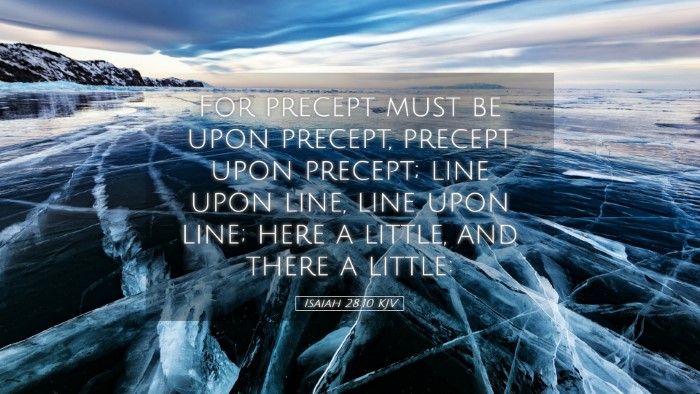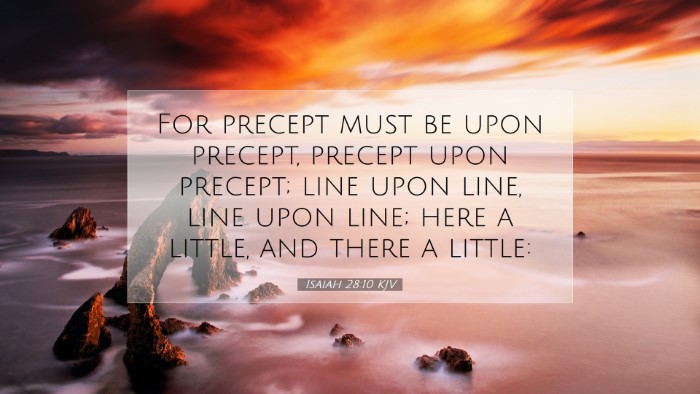Commentary on Isaiah 28:10
Verse Reference: Isaiah 28:10
"For precept must be upon precept, precept upon precept; line upon line, line upon line; here a little, and there a little."
Introduction
Isaiah 28:10 is a profound statement that reflects the method of teaching and understanding divine truth. It presents an image of the incremental and layered way in which God imparts knowledge to His people. This commentary draws insights from various public domain sources such as Matthew Henry, Albert Barnes, and Adam Clarke, providing a holistic view of the verse's implications for theology and pastoral practice.
Contextual Analysis
Isaiah 28 is set against the backdrop of God’s warning to Israel, particularly addressing the leaders and people of Ephraim who were characterized by their pride and drunkenness. This verse serves as a response to their flippant disregard for God’s truth and a critique of their approach to learning.
Henry notes that the context involves a divine message being directed toward a people in distress due to their moral and spiritual failing. The repetition found in Isaiah 28:10 serves to emphasize the need for careful attention to divine instruction.
Interpreting "Precept upon precept"
The phrase “precept must be upon precept” implies a structured learning process, where foundational truths build upon one another. Adam Clarke suggests that each precept provides essential building blocks for understanding God’s expectations and commands.
- Methodical Instruction: Clarke emphasizes that God’s teaching is methodical, designed to lead the faithful toward maturity. Understanding emerges not only from isolated truths but from the connection of these truths.
- Progressive Revelation: Barnes interprets this as a sign of God’s progressive revelation, where deeper truths are revealed through the passage of time and accumulated knowledge.
Line upon Line
The repetition of “line upon line” suggests meticulousness in God’s law. According to Matthew Henry, the “line” refers metaphorically to measuring or delineating the areas of life where God’s truth applies. This emphasizes the precision with which God outlines moral and spiritual directives.
- Divine Accuracy: This indicates that God's word is finely crafted and accurate—each line is deliberate and serves a specific purpose in guiding believers.
- Consistency in Teaching: The repeated structure encourages consistency in the teaching ministry, underscoring that strong theology should be built systematically over time.
The Importance of Incremental Learning
The phrase “here a little, and there a little” signifies a gradual accumulation of knowledge. It implies that understanding and wisdom are often acquired piece by piece rather than in overwhelming measures. Barnes affirms that the study of scripture should be undertaken regularly and with patience, allowing for a natural progression in understanding.
- Encouragement for Learners: For students and scholars alike, this verse encourages a humble approach to learning God’s word—recognizing that comprehensive understanding takes time.
- Pastoral Application: Pastors are reminded to preach in ways that build upon previously taught truths, fostering a culture of learning within the congregations.
Cautions against Our Approach to Scripture
Isaiah 28:10 serves as a caution against hasty interpretations and superficial understandings of scripture. Henry expresses concern that the people of Israel were not only dismissive of God's words but sought to shortcut their learning process, opting for sensational experiences over substantive truth.
- Spiritual Complacency: This verse warns against spiritual complacency. The tendency to gloss over details can lead to misunderstanding and misapplication of God’s word.
- Rebuke of Arrogance: The context of Isaiah indicates a rebuke towards those who were arrogant in their understanding, believing they had enough knowledge without the hard work of digging deeper.
Theological Implications
This verse can serve as a cornerstone for discussions regarding the nature of revelation and the doctrine of scripture. Both Clarke and Barnes emphasize the importance of intentionally studying scripture to uncover layers of meaning.
- Doctrine of Revelation: This highlights the belief that God’s word is revelatory, offering insights that can be understood only after careful interpretation.
- Encouragement to Dig Deep: The theological implications encourage believers to approach scripture with an expectation of deeper revelation through diligent study.
Practical Applications for Ministry
Pastors and leaders in the church can take several lessons from Isaiah 28:10. The emphasis on structured, incremental learning should inform preaching methods and discipleship programs.
- Structured Teaching: Create curriculum that builds upon previous teachings and allows for a logical flow of biblical doctrine.
- Encourage Study Groups: Promote small groups that focus on studying scripture together, allowing members to discuss and piece together truths.
- Patience in Growth: Remind congregants that spiritual growth is a process; seasoned believers should mentor newer members through the journey of understanding.
Conclusion
Isaiah 28:10 articulates a profound principle of learning and teaching within the faith. The layered approach to God’s precepts provided in this verse serves as a reminder of the necessity for diligence in both the study of scripture and in the act of teaching. For pastors, theologians, and students alike, the call is clear: approach God's word with reverence, patience, and the commitment to learn "precept upon precept."


